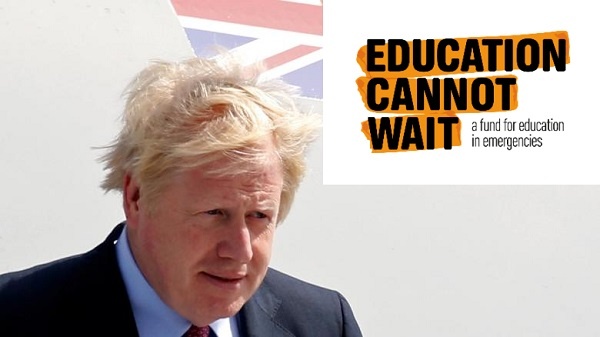
Funding will give 600,000 children and youth living in conflicts and emergencies the hope and opportunity for a better future through education, according to the nonprofit organization Education Cannot Wait
NEW YORK – Education Cannot Wait warmly welcomes today’s announcement by the Prime Minister of the United Kingdom, Boris Johnson, to allocate £90 million (US$110.5 million) in new funding to provide education opportunities for vulnerable children and youth caught in armed conflicts, natural disasters, forced displacement and protracted crises around the world.
“This generous contribution for education in emergencies by the United Kingdom’s Department of International Development (DFID) to Education Cannot Wait (ECW) is the largest, single contribution received thus far and will have a massive, positive impact,” said Yasmine Sherif, Director of Education Cannot Wait. “It will benefit 600,000 children and youth – especially girls – whose education is disrupted and leaves them furthest behind due to armed conflicts, natural disasters and other emergencies around the world.”
“We are deeply grateful to the Prime Minister, DFID and all the people of the United Kingdom for their generosity and confidence in the progress being made to rapidly and efficiently invest in quality education in some of the world’s most dangerous and unstable situations,” continued Sherif. “This progress is a collective one: Education Cannot Wait applies the New Way of Working in close collaboration with governments, UN agencies, civil society and the private sector.”
“Innocent children suffer the most from the brutal reality of life in the world’s most dangerous countries. I’m determined to ensure that all children have a chance to succeed – no matter where they are born. It is only through equipping the adults of tomorrow with learning and skills that we will break this cycle of instability.”
Prime Minister Boris Johnson
This significant contribution will accelerate access to education for girls as a priority, as well as for children with disabilities, children from minority groups, and refugee and displaced children. These are among the most vulnerable and most excluded from a viable, quality education that will bring them the hope, learning, safety and opportunity they need, want and deserve.
“This investment in education is not only an investment in children and youth, it is indeed an investment in our shared humanity. For a girl in a conflict or crisis-stricken country, it is a double investment: education is an empowering, transformative force for good, which also helps end the denial of her humanity,” said Sherif. “It also makes good on global commitments as it will accelerate progress towards Sustainable Development Goal 4: to ensure inclusive and equitable quality education.”
Girls in crisis settings are nearly 2.5 times more likely to be out of school than those living in countries where there is no crisis. In armed conflicts and other crises, out-of-school girls are at high risk of sexual abuse and exploitation, forced and early marriage, recruitment and child labor. Education can offer them the hope, protection, sense of normalcy and possibility of a brighter future that they need and deserve.
“Children living through wars and humanitarian crises have had their childhood taken away from them. We will not allow their future to be lost as well. This is why UK aid is helping some of the most vulnerable children, particularly girls, get the education they deserve. This will have a transformative effect on their lives.”
International Development Secretary Alok Sharma
The Government of the United Kingdom is a founding member of Education Cannot Wait. With this new unprecedented pledge, the UK becomes Education Cannot Wait’s biggest donor, with the UK’s total contribution now amounting to US$154 million to the global Education Cannot Wait fund.
ECW and its partners have already reached nearly 1.5 million children and youth in crises with quality education opportunities, and plan to launch multi-year educational responses in 25 priority countries by 2021. It is the first global multi-lateral fund dedicated to education for children and youth in war zones, natural disasters and crises.
Civil society organizations around the world have joined Education Cannot Wait in welcoming DFID’s important contribution and appeal to other governments, the private sector and philanthropic organizations to urgently mobilize $1.8 billion in funding for education in emergencies by 2021 to support 9 million children annually.
About Education Cannot Wait (ECW)
ECW is the first global fund dedicated to education in emergencies. It was launched by international humanitarian and development aid actors, along with public and private donors, to address the urgent education needs of 75 million children and youth in conflict and crisis settings. ECW’s investment modalities are designed to usher in a more collaborative approach among actors on the ground, ensuring relief and development organizations join forces to achieve education outcomes. Education Cannot Wait is hosted by UNICEF. The Fund is administered under UNICEF’s financial, human resources and administrative rules and regulations, while operations are run by the Fund’s own independent governance structure.
ECW various investments in education in emergencies for children are operational in 29 countries around the world: Chad, Syria, Ethiopia, Yemen, Ukraine, Central African Republic, Madagascar, Nepal, Bangladesh, Afghanistan, Uganda, Somalia, Peru, State of Palestine, Democratic Republic of the Congo, Papua-New Guinea, Lebanon, Panama, Indonesia, Nigeria, Malawi, Mozambique, Ecuador, Brazil, Comoros, Cameroon, Colombia, Greece, Zimbabwe.
